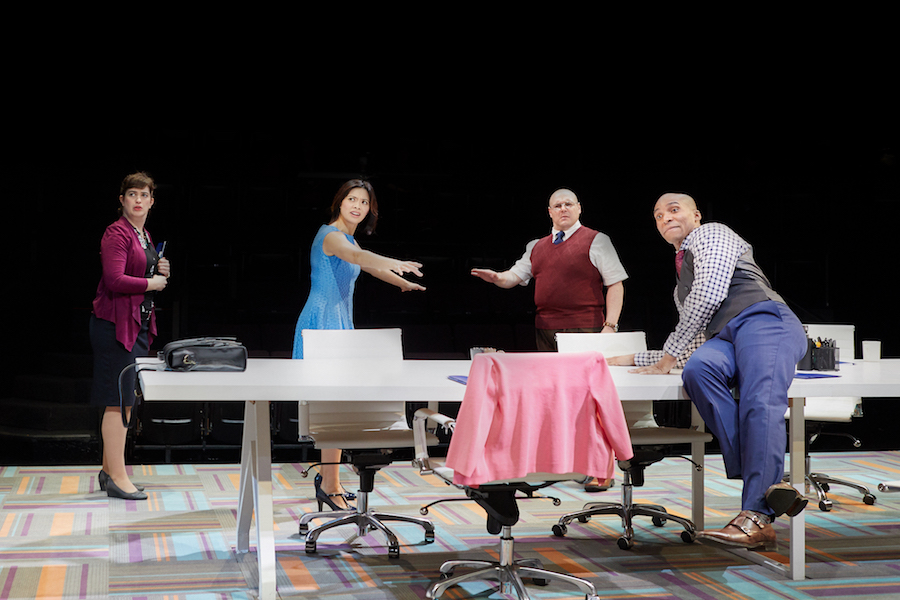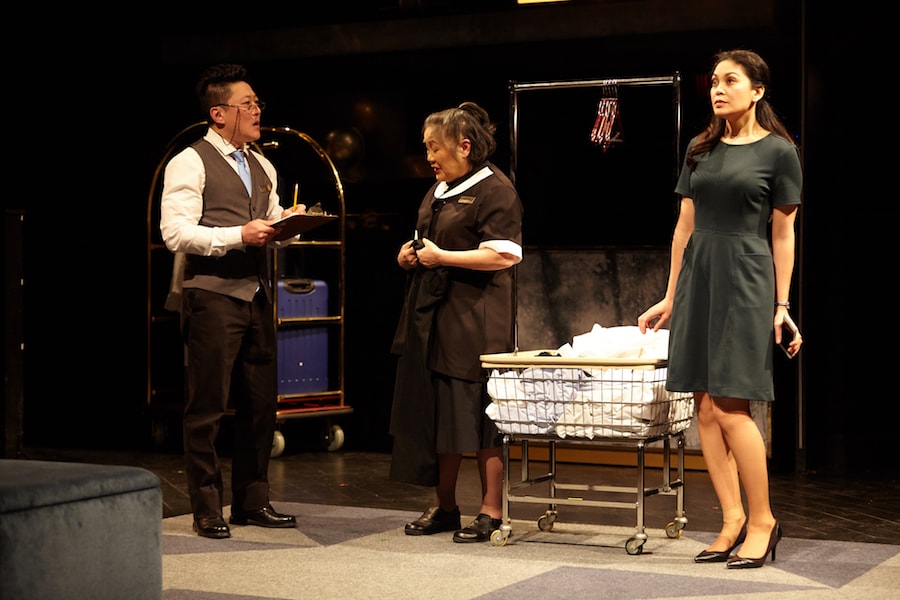Les Waters’s swan song was so loud that the theatre doled out earplugs. The departing artistic director of Actors Theatre of Louisville’s final turn at the helm of the Humana Festival of New American Plays (Feb. 28-April 7) was directing Mark Schultz’s Evocation to Visible Appearance. But while Schultz’s play featured a Satanic rock band, demonic dancing bears, and boom boxes dropping from the ceiling, it happened to lack the central element that characterized the rest of this year’s festival lineup: a tenacious, independent female lead.
Instead, Evocation’s protagonist, Samantha (played by Suzy Weller), is an angry 17-year-old girl who may or may not be pregnant. Her boss at the local burger joint confronts her deadbeat father about his daughter’s overall lack of enthusiasm. “Is her mom around?” he asks. With an older sister in a treatment center, Samantha lacks a North Star to lead her into the future, so she clings to a guy, an equally sullen soul, and together they just wait for the darkness to swallow them.
Perhaps Samantha could have used a pep talk from the Kilroys. Four members of the group delivered a fervent call to action to kick off the final weekend of the Humana Festival, to share their message of the #parityraid and announce that the organizers will be passing the baton to a new cohort of female theatre workers. The Kilroys group started out at a party in Los Angeles, among a gathering of like-minded women writers who were ready for change.
It seems that Humana, itself a kind of party (heavy on the bourbon), has traced a similar path. This year’s lineup of world premieres, with women being six of the festival’s nine writers and four female directors in the mix, pointed to way to the female future, happening now.

The ripe Do You Feel Anger? evoked, well, a lot of anger. Mara Nelson-Greenberg’s dark comedy follows Sofia (played by Tiffany Villarin), an empathy coach hired to educate the employees of a debt collection agency to make more compassionate phone calls. The men in the office, who think “empathy” is a type of bird, have a steep learning curve. The sedentary plot hits the theme over the head, teaching the men about personal boundaries, menstrual periods, and that women can indeed wear pants in the workplace. The bubbling tension of the suppressed women in the office results in a satisfying, startlingly bloody ending. I only wish the revenge plot came sooner.
For the elderly woman next to me in the theatre, the play’s #MeToo clarion call was #TooMuch. Some of the men I spoke to didn’t get it. But for many of the young women in the lobby, Do You Feel Anger? was the unanimous favorite—and the answer to the play’s titular question was a resounding “yes.”
Deborah Stein’s Marginal Loss also tackled work relations, but at a financial firm in the wake of 9/11. As a team works offsite at a New Jersey warehouse to keep the business afloat, women take the lead in the delicate balancing act of comforting co-workers’ families and processing million-dollar trades. The festival’s most nuanced female character, played by Nancy Sun, wrestles with grief, survivor guilt, and her complicated feelings about the company’s new temp—a young woman eager to help, and eager to find a permanent place among the wreckage.
Complicated relationships between mothers, daughters, sisters, and wives were at the center of Kentucky native Leah Nanako Winkler’s play God Said This. The play, written in a hospital waiting room as Winkler’s own mother received chemotherapy treatment, portrays family tensions around race and grief with surprising humor. It was beautifully directed by Morgan Gould, who made use of the theatre-in-the-round space as a way for the characters to navigate life, loss, and the cyclical patterns of female relationships.

Susan Soon He Stanton’s we, the invisibles chronicles the playwright’s time working at the Luxe Hotel in Manhattan. She frames her work experience, and a personal account of assault, through the 2012 incident in which French politician Dominique Strauss-Kahn assaulted hotel staffer Nafissatou Diallo at the Sofitel New York Hotel. The play pulls the invisible staff members of the Luxe into the spotlight as the central character interviews them to learn more about their lives as a way to humanize Diallo—and to gather information for the play itself.
The show You Across From Me, performed by the Actor’s Theatre’s 42-member Professional Training Company, was an energetic, whirlwind one-hour show of vignettes penned by Jaclyn Backhaus, Dipika Guha, Brian Otaño, and Jason Gray Platt. The scenes were all anchored by tables, and featured women holding court at dinner tables, office tables, and even foosball tables (in Backhaus’s playful offering, in which a woman took the reins as a sports announcer for a foosball championship between a woman and man).
Director Anne Bogart, co-founder of the SITI Company, bookended the final festival weekend with yet another call to action, urging theatremakers and creative thinkers to plan programming and execute theatre work thoughtfully. The speech detailed Bogart’s seven command verbs: Look Up, Take Aim, Speak Clearly, Practice Restraint Explosively, Be Filled With God, Embody Intentional Civics, and Learn to Entertain.
The final night was also marked by Lauren Gunderson‘s record of becoming the first woman to win the Harold and Mimi Steinberg/American Theatre Critics Association New Play Award twice.
“Women are often told to suppress their feelings of joy and glee when they get something awesome,” said Gunderson as she held her plaque high above her head in defiance.
Women’s feelings were blessedly unsuppressed at this year’s Humana.


